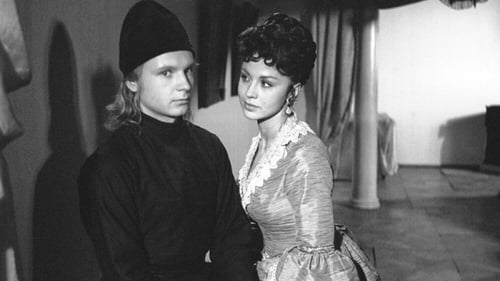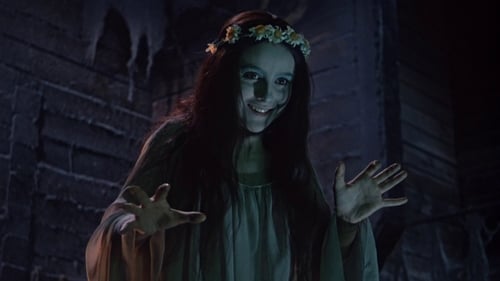
Sound
Based on the novel of the same name by Fyodor Dostoevsky. The tragic story of the Karamazov family takes place in a Russian province in the late 19th century. The relations of their father and three brothers are very complicated and contradictory. One of the brothers is accused of killing his father, whom he did not commit. The brothers are unable to help him, and only a loving girl follows him to hard labour.

Sound
O estudante de teologia Khoma Brutus vive uma situação inusitada quando é chamado para orar durante três noites pela alma de uma rica moça de um pobre vilarejo, morta em circunstâncias violentas. No entanto, trata-se de uma bruxa sedenta de vingança, que invocará lobisomens, vampiros e outras criaturas do inferno para atormentar a vida do pobre discípulo.

Sound
A group of Soviet counterintelligence officers manage to neutralize spies sent to the territory of the country to obtain secret information about the construction of a large military-industrial complex in Priozersk.

Sound
Dyuishen is assigned to the mountainous Kirghiz region of Central Asia by the Young Communist League after he is discharged from the Red Army. It is 1923 and the Civil war has ended. The former soldier becomes a teacher, bringing the Leninist doctrine to the remote Moslem area where elders did not allow children to go to school. He falls in love with one of his students, but the young woman is sold by her father to a wealthy chieftain. When the school is burned down, the majestic poplar trees that are a source of local pride are cut down to rebuild the new structure.

Sound
In the wealthy noble family of Popelsky, the only son Petrik is blind from birth. His mother Anna Mikhailovna, infinitely loving and pitying the boy, educates him as a rare fragile flower. And only Uncle Maxim, who fought under the banner of Garibaldi in his youth, is trying to accustom the boy to independence. The boy begins to recognize the world by touch, and one day his fingers find the keys of a piano. But, still not knowing the price of his talent, he leaves with the tramps "to seek the truth." And now only love can reconcile him with the world of the sighted.

Sound
The end of the 1950s. The Chinese passenger plane, following the Beijing-Moscow flight, enters a thunderstorm and makes an emergency landing in the Baikal region. In addition to the Soviet citizen Varvara Komarova, all other passengers are foreigners. Using a stop, they explore new cities and get acquainted with the life, work and rest of Soviet people.

Sound Engineer
The young composer Mikhail Glinka performs his new work at a soiree at earl Vielgorsky's house. However, the public is accustomed to Western music, and reacts coldly to the creation of the composer. This makes him very sad, but soon he decides to go learn the art of music in Italy. After returning from Italy, he is full of desire to write national Russian opera. Vasily Zhukovsky proposes a subject: a feat of Ivan Susanin. Tsar Nicholas I change the name of the opera to A Life for the Tsar and assigns a librettist - Baron Rosen. Acquaintance with the future co-author shocked Glinka: Rosen speaks Russian with a noticeable German accent. The premiere was successful, but Glinka was still not entirely happy with the libretto: "False words were written by Rosen". When Nicholas I learned that Ruslan and Lyudmila was written on Pushkin's subject, he sees it as sedition. The bitter experience of the composer brighten his supporters.

Sound Designer
"Se amanhã houver guerra" [Если завтра война] foi produzido nas vésperas da II Guerra Mundial. É um "típico" filme de propaganda patriótica bélica; sobre a capacidade da URSS de repelir qualquer agressor (dastaque para os alemães). Documenta treinamentos, desfiles, recrutamento e o preparo do Exército Vermelho para a guerra iminente. Dzigan, no início da década de 1930, havia feito filmes sobra a emancipação feminina tais como "O julgamento deve prosseguir" [1930, Женщина] -- camponeses, nas fazendas comunitárias -- e "Mulher" [1932, Суд должен продолжаться] -- citadinos, sobre o machismo e outros costumes burgueses. Na segunda metadade dos anos 30, Dzigan é designado como diretor de filmes militares, como "Nós somos de Kronstadt" [1936, Мы из Кронштадта] e este, o qual foi co-dirigido por Efim Dzigam [Ефим Дзиган], Lazar Antsi-Polovskiy [Лазарь Анци-Половский], Nikolay Karmazinskiy [Николай Кармазинский] e Georgi Beryozko [Георгий Березко].

Sound Recordist
Merry Fellows was the first Soviet musical comedy. Set in Odessa and Moscow in the 1930s. Shepherd Kostya Potekhin (Utyosov) is mistaken for an international concert star. He falls in love with Anyuta (Orlova) and plays the "star" for her. In a cascade of comic musical numbers he becomes the leader of a Jazz-Band and gives a hilarious show at the Odessa Music Hall. Now he is destined to perform at the Bolshoi Theatre in Moscow.








